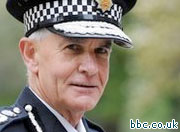The UK is in danger of drifting towards being a “police state”, one of Britain’s most senior chief constables has warned.
Greater Manchester Police’s Sir Peter Fahy, who takes a lead on the Prevent counter-extremism strategy, argued that it is not the security services’ job to define the line between free speech and extremism.
He said it is “better for that to be defined by wider society”, and not “securocrats” like himself.
Thought police
“There is a danger of us being turned into a thought police. This securocrat says we do not want to be in the space of policing thought or police defining what is extremism”, he commented.
He said that if these issues are left to the security establishment “then there is a danger of a drift to a police state”.
Sir Peter’s warning comes after Home Secretary Theresa May announced in September proposals for Extremist Disruption Orders, which both Christians and secularists have warned could damage free speech.
Extremist
May said she wants action to be taken against people who seek to “spread, incite, promote or justify hatred” against others on a number of grounds, including sexual orientation and transsexualism.
But The Christian Institute warned that under the proposals, anyone who opposes same-sex marriage could be branded an “extremist”, and the National Secular Society said those who criticised Sharia law could also be caught out.
A recent YouGov poll has found that close to a third of people believe they cannot speak freely on religion.
Constrained
The study by think tank the New Culture Forum showed 31 per cent feel unable to speak openly about religion, and just over a quarter (27 per percent) feel constrained on ethical issues.
In addition, 41 per cent of those surveyed thought people did not have as much freedom to speak their minds as they should, and just twelve per cent felt people were too free to speak their mind.
Oliver Wiseman, author of the report for which the polling was commissioned, said that in all sorts of contexts “Britons are wrapping themselves in intellectual cotton wool”.
Offence
Writing in The Sunday Times, he said: “Offence used to be an emotion, now it has become an argument.
“It is used to justify shutting down debate: offend religious leaders, offend mainstream opinion, offend conservatives, offend liberals, offend student politicians, offend “community leaders” — offend nearly anyone, and you run the risk of having your freedom to speak your mind curtailed.”
He commented that freedom of speech is “both an essential ingredient for, and a symptom of, a successful, open and tolerant society”.

